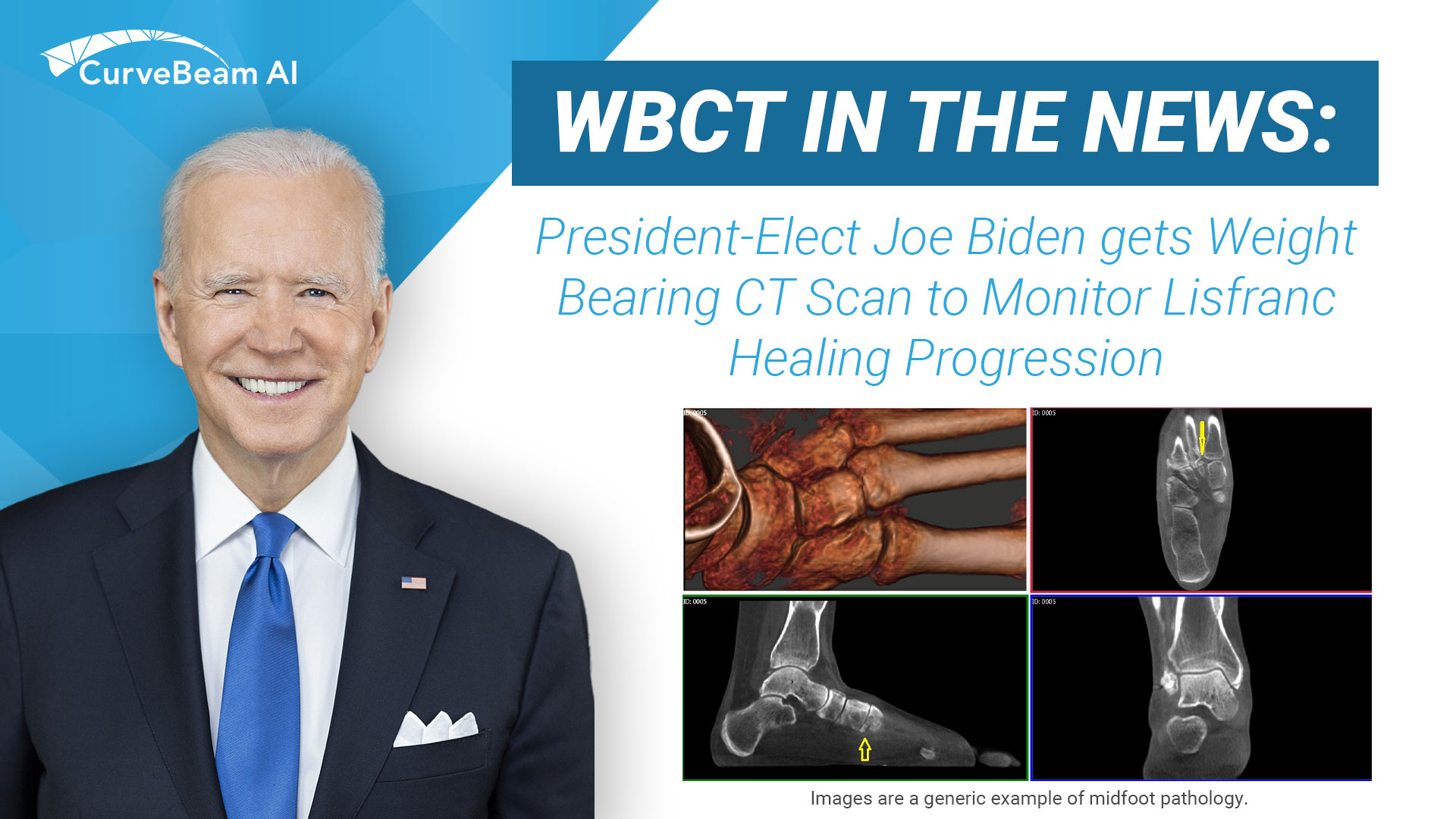President-elect Joe Biden’s physician recommended he get a weight bearing CT scan to monitor the healing progression of a sustained hairline fracture, according to an AP report.
President-elect Joe Biden’s medical visit to Philadelphia made headlines over the weekend after his physician recommended he receive a “special” weight bearing CT scan. Biden visited Pennsylvania Hospital, a Penn Medicine facility, to obtain the imaging exam.
Pennsylvania Hospital utilizes the CurveBeam pedCAT weight bearing CT system.
Dr. Kevin O’Connor, of the GW Medical Associates, said in statement Saturday morning ahead of the appointment, “Consistent with our original plan, President-elect Biden will receive routine 2-week post-injury imaging today. This will be performed with a special CT scanner which is able to obtain a ‘weight-bearing’ image. Now that the initial discomfort and swelling are decreased, it is important to observe the structures within the mid foot under the actual pressure of standing. This is the best way to assure ankle and foot stability.”
Biden, 78, arrived at Pennsylvania Hospital Saturday morning at around 11:20 a.m. and left the hospital’s Pine Building about an hour later. The president-elect suffered hairline fractures in his midfoot two weeks prior while playing with one of his dogs.
“Weight-bearing CT results were very encouraging,” said Dr. O’Connor after the appointment. “The small fracture in the intermediate cuneiform is barely detectable and the small fracture in the lateral cuneiform is healing as expected. No more extensive injury was identified.”
Initial X-Rays did not show any obvious fracture, but a follow-up CT scan confirmed a small hairline fracture in his midfoot.
Read more about diagnosing hairline fractures with weight bearing CT here.
“A weight-bearing CT scan has all the benefits of a standard CT scan with the additional advantages of revealing the stability of the midfoot,” said Dr. Steven Neufeld, MD, an orthopedic surgeon in Virginia. “Weight bearing CT scans can reveal any subluxation/dislocation (abnormal positioning) of the involved joints. MRI studies can create better images of soft tissues, but are but not required to diagnose a Lisfranc injury. ”
A Lisfranc injury is any injury to the midfoot. Lisfranc injures are commonly mistaken for a simple foot sprain, especially if the injury is a result of a simple twist or fall. However, bones in the midfoot may be fractured or the ligaments that hold them together may be torn. The severity can vary from simple to complex, may take many months to heal, and may require surgery to treat. Subtle Lisfranc injuries remain a challenge to diagnose.
“With weight bearing CT imaging ,’you can solve that Lisfranc case no one else can,” said Dr. Gary Briskin, DPM, a podiatrist in California. “It opens up the midfoot, which historically has been a problem for us.”
Weight bearing CT imaging was invented in 2011 just miles from where Biden got his scan by Pennsylvania-based company CurveBeam researches, designs and manufactures its weight bearing CT systems in the heart of Montgomery County.
The systems have been installed in prestigious hospitals such as Hospital for Special Surgery in New York City, N.Y. and Mayo Clinics. They’ve helped countless patients with foot, ankle and knee conditions get answers to why they are in pain.
CT imaging uses X-Ray technology to provide a three-dimensional picture of the bones and joints. Until the introduction of weight bearing CT systems, patients could only get a CT scan while lying down. The “weight bearing” view is critical for orthopedic surgeons when assessing the knees, feet and ankles, as bone and joint alignment changes when the patient is standing.
“When I first saw the news that the president-elect hurt his foot, I hoped he would be prescribed a weight bearing CT scan to have the most accurate diagnosis,” said CurveBeam President & CEO Arun Singh. “To see our technology recognized on the national stage by Biden’s physician was a milestone moment, and we hope it results in increased awareness of the modality in orthopedics and radiology, so all patients can benefit from it.”
